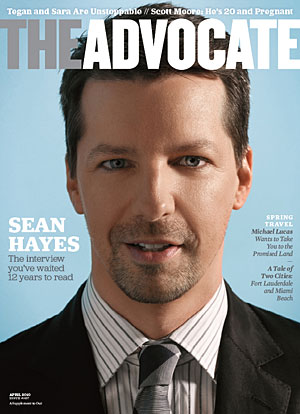It’s hard to know what to make of the contretemps over Newsweek‘s diss of Sean Hayes’ Tony-nominated performance in Promises, Promises. Ramin Setoodeh, whose controversial writing has drawn criticism in the past, set off fireworks when he suggested Hayes and Glee’s Jonathan Goff appear too gay to be convincing as straight love-interests.
 Setoodeh, who is gay, has responded to the criticism, saying he’d been inundated with nasty, personal attacks including phone calls and letters to his home. He also said the criticism–set off by a pointed rebuttal by Hayes’ co-star Kristin Chenoweth–was unfair since they misunderstood his larger point about why it is hard to accept a gay actor in a heterosexual role.
Setoodeh, who is gay, has responded to the criticism, saying he’d been inundated with nasty, personal attacks including phone calls and letters to his home. He also said the criticism–set off by a pointed rebuttal by Hayes’ co-star Kristin Chenoweth–was unfair since they misunderstood his larger point about why it is hard to accept a gay actor in a heterosexual role.
I was sharing my honest impression about a play that I saw. If you don’t agree with me, I’m more than happy to hear opposing viewpoints. But I was hoping to start a dialogue that would be thoughtful—not to become a target for people who twisted my words. I’m not a conservative writer with an antigay agenda. I don’t hate gay people or myself.
Setoodeh has previously caused controversy at Newsweek when he asked whether “queeny” gay characters on television harmed gay tolerance and a piece a couple of years ago questioning whether junior highs were prepared to deal with openly gay students.
Journalists–especially arts critics–should ask these kinds of questions, even if they are uncomfortable for the LGBT community to hear. Whether Sean Hayes or Jonathan Goff can be convincing as a straight character once people know they are gay is an interesting question that is not necessarily a reflection on their talents, which appears to be the point of the story. Setoodeh isn’t the first gay man to ask whether effeminate gay television characters on television are “good for the gays.”
So why the reaction, including the apparently uncivil response directed at Setoodeh? Aren’t critics supposed to be, well, critical? Why is it wrong for a critic–gay or straight–to question whether audiences are prepared to accept a gay actor in a straight role? Why is it difficult for the LGBT community to listen to criticism and quickly rush to label it “anti-gay” or homophobic?












